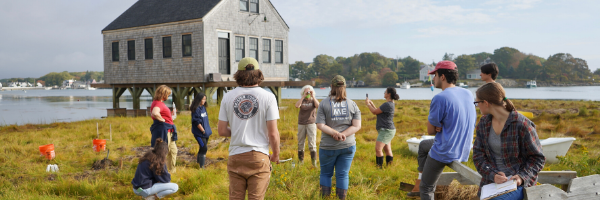#oceans
Slow the Rise Maine: High School Youth Action Project

Student Voices in Action
15 students in Southern Maine have banded together alongside educators Melissa Luetje (Kennebunk High School Science Teacher), Leia Lowery (Director of Programs & Outreach at TCI) and Pam Morgan (Professor in the Department of Environmental Studies at the University of New England) to educate their local community (and beyond) on the issue of Sea Level Rise, and how this and other climate change related impacts are threatening the places they love. Meet the students here.
Learn more about the student’s journey through their own words and vision by watching their Slow the Rise Maine Class Video, launching in honor of Earth Day 2021.
The class they are a part of is called the Gulf of Maine Field Studies, a dual enrollment class offering university science credits to both Kennebunk High School students and University of New England students as they work together to tackle climate issues in the Gulf of Maine.. The class is a collaboration between Kennebunk High School, University of New England, Kennebunkport Conservation Trust, Kennebunkport Climate Initiative and the Gulf of Maine Institute
The full-year class format uses science and technology as well as social science to start meaningful conversations in the community about climate change. It gives students a sense of ownership of the problems their town is facing as well as empowers them to take action both individually and as a team.
Why this class is so impactful
This class is unique, and as such is impactful. It takes a non-traditional approach to environmental education, rather than utilizing textbooks and conventional instructional approaches teaching in regards to content, this class puts students in the field, looking at environmental issues through an ecological, economical, and socio-cultural lens. Students dive deeply into local problems, such as invasive species and sea level rise, examine, suggest and test solutions.
Students also work with community members to create and execute action projects around what they’ve learned. Slow the Rise Maine is one of these action projects where students have incorporated fieldwork and social science research into their campaigns. The “asks” for their peers and community will lead to action.
Additionally, this class teaches students skills that will be advantageous in college and their careers. Collaboration, consensus-building and advocacy, and outreach builds confidence, give students a sense of belonging in their community, and gives them agency – which are all necessary skills not taught in K-12 education. These skills are important for an informed and involved citizenry.
Often times with environmental science education, the problems youth, and the world are facing seem insurmountable. This class gives students a starting point and shows them how they can actually make a difference where it counts. In their own back yards – which then has a positive impact globally.
Learning outside of the four walls of a classroom
Traditional science education has been within the confines of the four walls of the classroom. This does not bode well for environmental science education which requires young people and environmental science professionals to be out in the field interacting with their landscape and community. This class does the opposite. Because it is a UNE 200-level course, high school students get a taste of a college environmental science class and experience the impacts that their hard work has on their community.
“These students are changemakers. They have the passion, tenacity, and skills to further this important work. We’ve provided the roadmap and the rest of their journey is in their hands.”
– Melissa Luetje, Kennebunk High School Science Teacher
Register Today:
Learn more about this class project from the students themselves! Please register and join us for our Gulf of Maine Field Studies Class Webinar, Wednesday May 12th, from 7-8PM EST.
